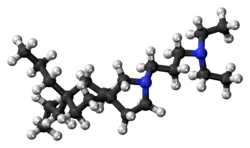Atiprimod
Atiprimod (INN, codenamed SK&F106615) is a substance being studied in the treatment of certain multiple myelomas and other advanced cancers. It may block the growth of tumors and the growth of blood vessels from surrounding tissue to the tumor. This drug is also being researched as a potential treatment for various autoimmune diseases. It was first developed by GlaxoSmithKline as a potential treatment for rheumatoid arthritis.[1] The substance is also known as azaspirane, although this more properly refers to the class of chemicals to which atiprimod belongs.
 | |
 | |
| Clinical data | |
|---|---|
| ATC code |
|
| Identifiers | |
| |
| CAS Number | |
| PubChem CID | |
| ChemSpider | |
| UNII | |
| KEGG | |
| ChEMBL | |
| CompTox Dashboard (EPA) | |
| Chemical and physical data | |
| Formula | C22H44N2 |
| Molar mass | 336.608 g·mol−1 |
| 3D model (JSmol) | |
| |
| |
| | |
This compound has also been shown to kill mantle cell lymphoma cells in vitro.[2]
Mechanism of action
Atiprimod has been shown to inhibit angiogenesis (growth of blood vessels) in a blood vessel model using chicken eggs. It is thought to inhibit the secretion of vascular endothelial growth factor (VEGF), a growth factor that promotes angiogenesis.
Chemistry
Atiprimod is an amphiphilic compound and a cation at neutral pH.
Synthesis

References
- Jacobs GS (Spring 2004). "Atiprimod: A New Drug Candidate in Early-Stage Development for Myeloma". Myeloma Today. International Myeloma Foundation. 5 (10). Archived from the original on 2011-07-18. Retrieved 2010-09-30.
- Wang, M.; Zhang, L.; Han, X.; Yang, J.; Qian, J.; Hong, S.; Samaniego, F.; Romaguera, J.; Yi, Q. (2007). "Atiprimod inhibits the growth of mantle cell lymphoma in vitro and in vivo and induces apoptosis via activating the mitochondrial pathways". Blood. 109 (12): 5455. doi:10.1182/blood-2006-12-063958. PMID 17317853.
Further reading
- Hamasaki M, Hideshima T, Tassone P, et al. (June 2005). "Azaspirane (N-N-diethyl-8,8-dipropyl-2-azaspiro 4.5 decane-2-propanamine) inhibits human multiple myeloma cell growth in the bone marrow milieu in vitro and in vivo". Blood. 105 (11): 4470–6. doi:10.1182/blood-2004-09-3794. PMC 1895034. PMID 15705788.
External links
- Atiprimod entry in the public domain NCI Dictionary of Cancer Terms
![]() This article incorporates public domain material from the U.S. National Cancer Institute document: "Dictionary of Cancer Terms".
This article incorporates public domain material from the U.S. National Cancer Institute document: "Dictionary of Cancer Terms".